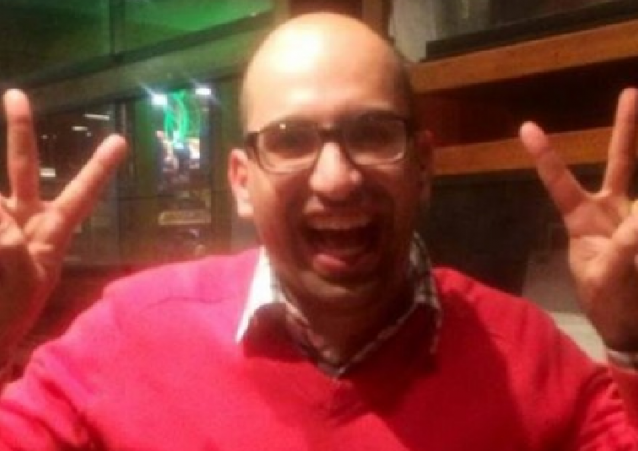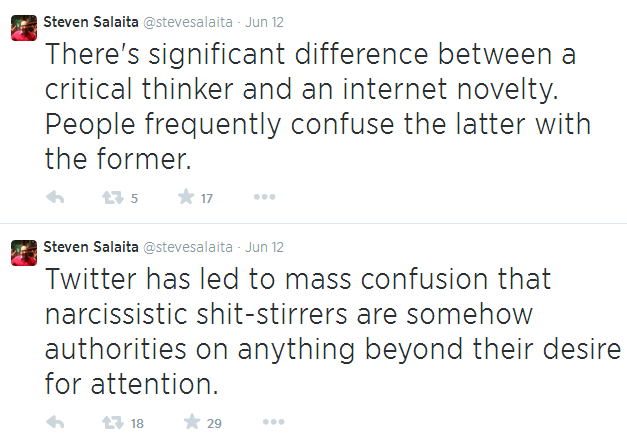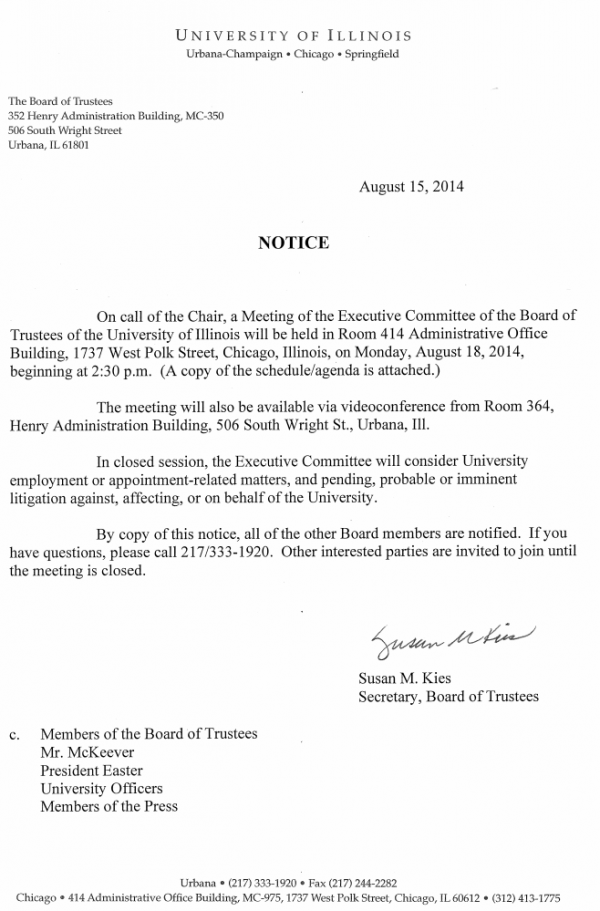Con Law Profs letter supporting Steven Salaita rests on speculative ground
When all the facts are known, it may not be a simple case of viewpoint discrimination.

The denial of employment by the University of Illinois at Urbana-Champaign (UI-UC) to Steven Salaita has created a storm of controversy within academia, with reports also circulating superficially in the mainstream media.
The news first broke on August 6, 2014, in an article at Inside Higher Ed, Out of a Job, which noted that neither UI-UC nor Salaita was talking, but contained this critical paragraph (emphasis added):
The sources familiar with the university’s decision say that concern grew over the tone of his comments on Twitter about Israel’s policies in Gaza. While many academics at Illinois and elsewhere are deeply critical of Israel, Salaita’s tweets have struck some as crossing a line into uncivil behavior.
That paragraph led to the assumption by virtually the entire academic community and media that Salaita’s tweets were the cause of the withdrawal. It was based on that report that even we noted in our first post about the withdrawal, Anti-Israel Prof. Steve Salaita loses job offer at U. Illinois over hateful tweets.
Since then, anti-Zionist and anti-Israel websites routinely frame the issue as one of viewpoint discrimination and suppression, even though anti-Israel views are widespread on college campuses and in academia. Other more neutral academic and media commentators also have assumed the viewpoint discrimination.
But other than the Inside Higher Ed report based on unknown sources as to a “concern … over the tone” of the tweets, there does not appear to be any demonstrable factual basis for saying that the tweets, much less the viewpoints, were the reason for the denial of the position.
Documents produced pursuant to FOIA show that Salaita had a signed agreement [pdf.] but the position was contingent on approval by the Board of Trustees. The contract referred to is as a “recommendation for appointment,” not a completed binding appointment. Such contingency is what the current dispute is about.
The parties are maintaining a remarkable silence according to the local newspaper, which may reflect settlement discussions or intense preparation for litigation.
The August 7, 2014, letter [pdf.] sent by the Center for Constitutional Rights, which has a unit devoted to supporting the anti-Israel boycott movement, made only the conclusory claim that:
…. at bottom the University’s decision to terminate his position is transparently due to the University’s objection – or the objection of others pressuring the University – to the substance of his political expressions on an issue that is controversial and surfaces deeply held, passionate and sometimes harsh expressions of opinion ….
CCR is acting as attorney for Salaita, so presumably it had access to whatever information Salaita himself had, yet there are no specifics detailed (and indeed, Salaita may not know the reason other than supposition).
Which brings me to a letter signed by over 20 law school constitutional law professors [pdf.], including several of my colleagues at Cornell Law School. The letter strongly and definitively accuses UI-UC of violating Salaita’s contractual, academic freedom and constitutional rights, and demands that Salaita’s file be transmitted to the Board of Trustees for approval of his tenured position.
The letter has been cited far and wide among Salaita supporters as definitive proof that UI-UC acted unlawfully, and is being used as fodder in a proposed academic boycott of UI-UC by the same people who support the academic boycott of Israel. (These Israel boycotters seem oblivious to the irony that they are the worst destroyers of academic freedom themselves.)
The constitutional law professors signing the letter are, indeed, well-qualified and I have no qualms about the general principles of law expressed in the letter. I also do not doubt they are acting in good faith.
But there is a critical flaw in these professors’ analysis — they assume facts and causation which are not currently demonstrable, and thus build their definite legal conclusions on speculative factual ground. It may turn out they are right, but as of this moment they engage in speculation as to the facts.
Here are a few snippets from the law professors’ letter showing the presumption of viewpoint discrimination and causal connection (emphasis added):
- As scholars of free speech and constitutional law, we write to express alarm at your decision to revoke a tenured offer of appointment to Professor Steven Salaita to join the American Indian Studies program at the University of Illinois at Urbana-Champaign on account of his statements on social media criticizing Israel’s conduct of military operations in Gaza.
- In our view, the decision to withdraw an appointment to a prospective faculty member because of his statements on a matter of public concern raises serious concerns under established principles of academic freedom.
- Without question, the withdrawal of a promised offer of employment to Professor Salaita on account of his opinions on the Middle East patently violates this well-established Constitutional principle, imposing a particular orthodoxy with respect to a complex matter of public concern and punishing a prospective faculty member who refuses to comply with that orthodoxy.
- What is more, the constitutional problem underlying the withdrawal of an offer of employment to Professor Salaita on account of his opinions on the Middle East affects not only him individually, but all current and prospective faculty….
- Tragically, the University of Illinois’s decision to rescind a job offer to Professor Salaita on account of his views on the Middle East evokes similarly unconstitutional litmus tests applied to educators in Illinois ….
- Given the circumstances surrounding the rescission of the accepted offer of employment to Professor Salaita on account of his speech in connection with the conflict in the Middle East….
- For this reason we take particular offense at the notion that the University of Illinois at Urbana-Champaign would succumb to pressure by those who disagreed with Professor Salaita’s viewpoint on current Israeli policy and withdrawing an offer of employment on the University of Illinois faculty, as we would take offense at any university’s bowing to external pressure regarding a professor’s outspoken views on other issues….
- Moreover, the timing and manner of Professor Salaita’s dismissal strongly indicate the sort of viewpoint discrimination that would violate the First Amendment even at the hiring stage.
The factual scenario presented in the letter is one of simple viewpoint discrimination and succumbing to pressure leading to withdrawal of the offer. But other than speculation and conjecture, there is no basis for saying that UI-UC made its decision on such a simple basis.
There are other potential scenarios and questions that need to be answered, which may cast the legal analysis in a very different light than simple viewpoint discrimination and succumbing to pressure.
For example, on the contract claim, the assertion is that Salaita has a strong case under the doctrine of Promissory Estoppel, which requires a showing that there was some unequivocal and clear promise upon which Salaita reasonably relied, which induced Salaita to take action, which warrants disregarding the Board approval contingency in the contract as a matter of equity.
A least one contract law professor expresses strong disagreement as to these claims of equitable estoppel on both legal and factual grounds. (Opposing view here.)
Before we could resolve this contract issue, we’d need to know a lot more than we currently know. For example, what specifically was Salaita promised, by whom, was that person in a position to make such a promise, and was it reasonable for Salaita to rely on such a promise by such person in light of the contractual contingency and the common understanding as to authority in higher education? Did Salaita knowingly, or recklessly, take a risk in resigning from his prior tenured position before UI-UC Board approval, such that some or all of his damages were preventable or caused by his own negligence?
As to First Amendment claims, what if this was not viewpoint discrimination?
Is there some reason to believe that a viewpoint-neutral justification is just a pretext? What is the history of hiring and Chancellor conduct as to anti-Israel prospective faculty?
What if the tweets simply caused UI-UC legitimately to take a fresh look at the file in preparation for required Board of Trustee’s approval, and upon that review the Chancellor’s office questioned the hire in the first place.
That would be potentially relevant here considering Salaita was recommended for a spot in the American Indian Studies Department, but Salaita’s writing on American Indian issues is very thin (he devotes most of his attention to Israel and Palestinian issues).
What if in the course of that review other issues were uncovered?
What if the tweets presented Salaita in a light inconsistent with that presented in the departmental and search committee profiles and recommendations? Or the Chancellor questioned the stability and professional judgment of Salaita based on the arguably unhinged nature of the Twitter stream quite apart from the viewpoints expressed and the profanity used?
What if Salaita being anti-Israel had nothing to do with the decision, since so many faculty at UI-UC and elsewhere are anti-Israel, but was more complicated and took into account the myriad of hiring factors that even the law professor letter acknowledges are legitimate?
What if the UI-UC administration, upon reviewing the file and Salaita’s Twitter stream came to the conclusion that Salaita was the type of person Salaita described in his own tweets with regard to people on the internet:
I don’t know why UI-UC did what it did. And neither do the law professors who nonetheless issued a definitive and unqualified legal opinion that Salaita’s contractual and constitutional rights were violated.
Two UI-UC professors have penned an op-ed in the local paper cautioning against jumping to conclusions as to the facts:
There are two aspects of this public debate that are based on questionable assumptions. The first is the frequent assertion that Salaita’s position offer was terminated because of his stance on the Palestinian-Israeli conflict. There is, at this point, no evidence that this is the case: Many faculty hold similar views on the Middle East, and no one has suggested that they are not entitled to engage in open debate over this controversy….
The question is not whether Salaita has a First Amendment right to make such comments — of course he does. It is whether, in light of this new information, the university has the right to choose not to proceed with hiring someone who speaks and writes that way in public.
There is a serious policy question here of how to manage a situation in which new and damaging information comes to light about a prospective hire after an initial letter of offer is sent, but before the beginning of the appointment period and before final board approval.
At Virginia Tech, his previous institution, the university chose to publicly disavow some of his extreme comments, in order to protect its own reputation. And apparently they have made no effort to retain Salaita after he received word that board approval would not be sought for his appointment at Illinois….
The other questionable assumption of the current debate is that the university’s action violates Salaita’s academic freedom. But the principle of academic freedom is not an absolute, open-ended license; the AAUP’s own statement on principles of academic freedom emphasizes that faculty are also bound by the standards of professional ethics: “As scholars and educational officers, they should remember that the public may judge their profession and their institution by their utterances. Hence they should at all times be accurate, should exercise appropriate restraint, (and) should show respect for the opinions of others ….” Salaita’s comments raise legitimate questions about the limits of academic freedom.
An honest debate about this case would engage these serious and difficult questions, instead of invoking the familiar frame of faculty victims being silenced by evil administrators. That framing might serve other political agendas, but it does not serve the campus or the wider academic profession well — and it does not fit the facts of this case as we know them, so far.
Had the constitutional law professors letter acknowledged this uncertainty, and couched its conclusions based on hypothetical scenarios, the letter would be more persuasive.
It may be that tomorrow we wake up and there will be a leaked memo describing a nefarious viewpoint stifling agenda. Or that a year or two from now a jury will come to that conclusion.
But as of this moment, such simplicity is absent from any demonstrable facts.
Update: Looks like something up for Monday at Board of Trustees:
Donations tax deductible
to the full extent allowed by law.










Comments
Strange letter.
established principles of academic freedom
What sort of principle is it? Legal?
A bit further on,
patently violates this well-established Constitutional principle
It still seems to be talking about “academic freedom”, but suddenly it’s a Constitutional principle.
Conflation of distinct concepts, a common tactic in progressive polemics, is usually a pretty clear sign that the user is trying to use sloppy reasoning to pull the wool over somebody’s eyes.
The idea that this shoddy scholar will now become the poster child for the BDS charade is simultaneously sad and laughable; but not as laughable as the idea any college professor would be shunned for demonizing Israel.
To the contrary, proudly displaying your anti Zionist credentials on campus seems de rigueur if a budding scholar wants any chance at tenure, or at the very least a free parking spot.
“Proudly displaying your anti-Zionist credentials.” Evidence?
I suspect that “academic freedom”, like a lot of ideas, suffers from “mission creep”.
Maybe every decade or so, it would be a good idea to rectify it back to what it should mean.
They offered the guy a job. He accepted. Then they found out he’s an ass, so they took back the job. Why should schools be any different from the private sector where “employment at will” is common? Happens all the time. The education field is filled with incompetents already and weeding some out is good thing for whatever reason. How many people reading this can say there wasn’t a teacher in their lives that did not belong in the classroom?
Salaita wrote a book in 2011 titled, “Israel’s Dead Soul”. If the book is as anti-Israel as the title suggests, then the rescission of the employment offer can not have been because of his anti-Israel views. He had already publicly published his anti-Israel views several years before the offer of employment was made. Surely the search committee is aware of the book’s existence.
I can only assume that the book’s title is far more inflammatory than the actual content. Because if content is indeed anti-Israel as suggested by the title, then there is no basis for asserting the employment offer was rescinded based on his views. Is it possible the 20 constitutional law professors who wrote the letter insisting the employment offer be re-instated are not aware of the book? It took me a grand total of about five seconds to find it after I Googled Salaita’s name. The Amazon link to the book was on the first page of the search results.
Virginia Tech apparently knew who he was and seemed fine with his departure.
I have to say that the ‘inside baseball’ aspects of this matter are beyond what time I want to spend to understand. But if the CCR is representing Salaita, that’s all I need to know: the CCR is a nasty, venomous group of people who truly are anti-American.
While everyone is “speculating,” I’ll add to the mix and say it’s speculative to assume that not hiring Salaita would be more “damaging” to U of I than hiring him, given what has occurred since the non-hire, de-hire, firing, whatever was announced.
To date, over 1500 professors have signed letters in support of anti-Semitic Steven Salaita.
The Chancellor is under enormous pressure to reverse the decision with petitions, calls for UIC boycotts, and possible financial threats to UIC (see example below):
https://twitter.com/CoreyRobin/status/500146877837615104
Please write to University of Illinois Chancellor Phyllis Wise ([email protected], [email protected], [email protected]) to let the University administration know that the decision not to hire Steven Salaita as a professor has widespread support from the general public.